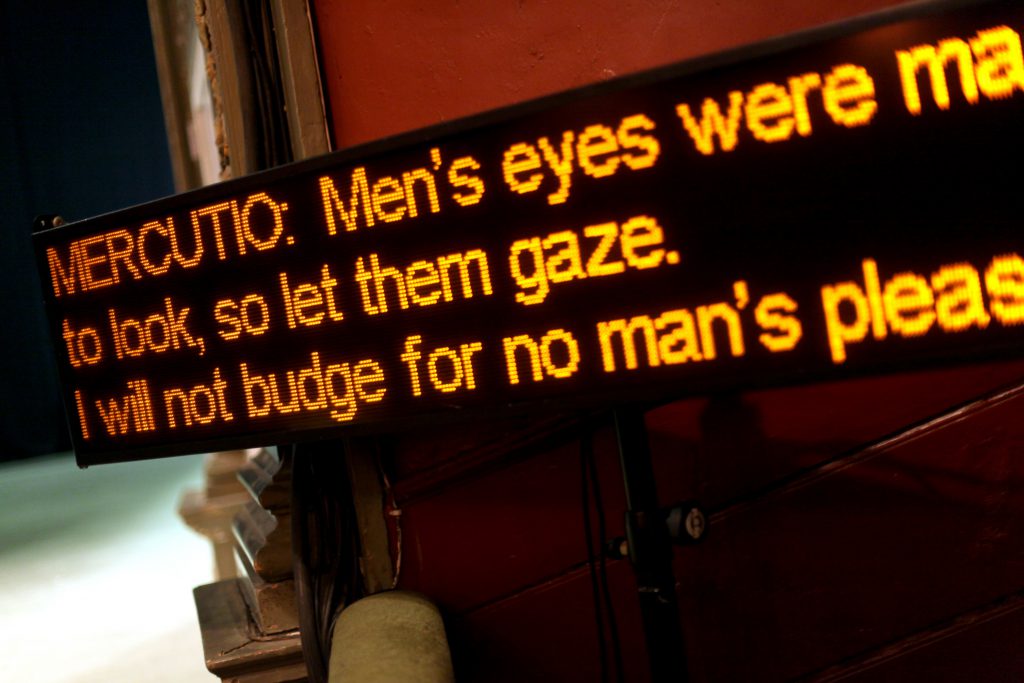Michelle Hedley, a member Stagetext’s User Panel, writes an open letter to theatres about the positioning of caption units, and how it makes all the difference to the audience.
“I first discovered the magical world of Stagetext back in 2011 after a chance tweet from an actor who had taken a photo of the caption units being installed for that night’s performance. I was enthralled by the idea, and once I found a local performance, tickets were booked. You could say that my life was changed forever by that tweet!
“Fast forward a few years (eight to be precise) and I have seen captioned performances around the UK. It has been interesting to experience how captions are treated by theatres, big and small, and see how they approach access as a whole.
“Stagetext have always advised audiences to check with theatres before booking, to find the best seats to see the unit(s) whilst still engaging with the performance. This is always the first thing I do when I go to a theatre, I check with the box office staff and make sure I book the right area. Staff should be trained and well informed and able to advise on how to get the most from the captions. d/Deaf theatregoers are very reliant on this at a new venue, so it is very important to get this right.
“I have found that my viewing experience has varied greatly from venue to venue due to the positioning of the caption units. Stagetext trains venues and advises on the optimal position of caption units so audiences can see them and take in the performance at the same time with minimal eye movement and certainly no head movement. This reduces the ‘Wimbledon’ or ‘bouncing ball’ effect when switching from captions to actors, an effect that can be quite severe when venues don’t plan properly.
“It wasn’t until I visited the National Theatre two years ago to see Follies with captions that I discovered how important it is to get the positioning of the units right. I was as mesmerised as I was the first time I attended a captioned performance. I was able to relax and watch the show with barely any effort at all to see the captions at the same time as the performance. A slight movement of my eyes (without moving my head) was all that was required and it was such a revelation! I left that show just as excited about the quality of captions as I was about the performance.
“This experience brought home to me how important it is to ensure that the caption units are in the right place. Otherwise we are forced to choose between missing the action on the stage or missing some of the words, as poorly positioned units cannot let us see both. Ideally, the units should be as close to the stage as possible, or even on the stage if it doesn’t intrude with the actors.
“Sadly, my own local theatre has theirs quite a distance away and it is very reminiscent of “Wimbledon” as I have to switch between action and words and usually come away with a sore neck. Despite my continual feedback no changes have yet been made so it is something that I am forced to put up with.
“There are however many theatres that have achieved a good balance: Harrogate and Edinburgh Playhouse both have theirs on the stage on a pillar/overhang which minimises movement whilst watching the action. Sunderland Empire, The Criterion and other theatres in the West End have theirs off the stage but still very close to the action to enable caption users to be comfortable.
“This demonstrates that access is not simply about providing captions. It is very important to get the positioning right. Sit in the auditorium and try to see if you can watch the show without moving your head away from the stage to read the captions. Ask for feedback from the people that actually use access – you can even invite people to try it out before a show so they can advise on the best seats. More importantly, act on the feedback. If the position is too far away, look for a compromise. Remember that the captions really make a difference, so it is worth making an effort to get it right.
“Theatres have a marvellous opportunity to forever change peoples’ lives. When they get the various elements of captioning right, it creates a magical world that is wonderful to experience!
If you’d like to share your thoughts and opinions on access in the arts we’d love to hear from you. Please contact Alic Joy on [email protected].




